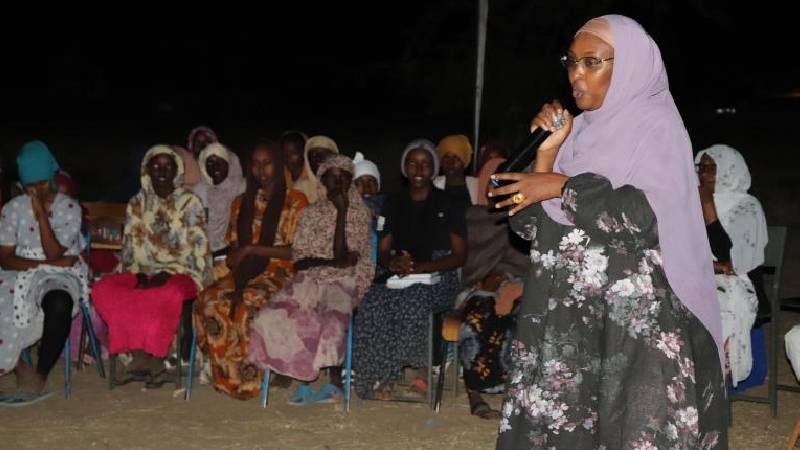
The fight against FGM should be a collective effort involving both men and women who must all unite to ensure the eradication of these harmful practices and protect the rights of girls.
This was a message that was echoed by leaders who attended a ceremony in which 179 girls graduated from the Gaddis Gamme Girls Camp, an initiative led by Marsabit County First Lady Alamitu Jattani.
"There is no justification whatsoever, in the name of culture, for Borana girls to undergo FGM," declared Galm Dabaso, a member of the Borana Council of Elders.
"We must all unite to ensure the eradication of these harmful practices and protect the rights of girls in our society," echoed Willis Odhiambo, the Programme Lead for the Mama Guyo Foundation.
Marsabit First Lady Alamitu Jattani, in her address, during the celebration also emphasised that the fight against FGM should be a collective effort involving both men and women.
She commended the groundbreaking progress made by the Borana Gada, who outlawed FGM two years ago, effectively eradicating the practice from their culture.

Jattani urged the Borana Gada Council to ensure the ban's comprehensive implementation across all Borana territories.
Speaking to the Borana council of elders, who were also present, Jattani passionately asserted the importance of special sittings.
- Over 100 people die by suicide in three months in Nyeri County
- Kenya steps up health investments to safeguard mothers and children
- Kenya elevates care work as a public good, pledges bold action to empower caregivers
- Digital spaces fuel rise in online sexual abuse of women amid weak safeguards
Keep Reading
"I urge you to hold special sittings in Borana inhabited areas of Kenya to reiterate that declaration and enforce it within our national borders. By doing so, these declarations will resonate throughout the nation and strengthen the ownership of the Kenyan Boran community and our neighbouring communities," Jattani said.
She acknowledged the sensitivity surrounding discussions about FGM and early marriages within a society that historically refrained from such conversations.
However, she also emphasised the necessity of openly addressing these issues to eradicate harmful practices.
"We have already avoided talking about these issues for far too long, and that has been to our own detriment because, in our silence, so many young women and girls have suffered," she said.
The girls' camp, organised under the auspices of the Mama Guyo Foundation, recognises the immense potential of empowered girls in driving positive change within society.

The camp aims to combat Female Genital Mutilation (FGM) and gender-based violence (GBV) in the community. Over the last four years, a total of 2,689 girls have successfully completed the programme.
Over the four-day training program, the focus primarily lies on fostering self-awareness, promoting human rights, emphasising hygiene and sanitation practices, and addressing critical issues such as FGM, early marriages, sexually transmitted diseases, and teenage pregnancies. Additionally, the camp offered life skills training, communication and problem-solving sessions, and academic counselling.
While the Gaddis Gamme programme condemns harmful practices like FGM, it also celebrates the rich heritage and positive aspects of culture, such as sociability, social fabric strengthening, cohesion, self-respect, respect for others, and reverence for elders and youth.
This is the seventh graduation ceremony since the Gaddis Gamme programme began in December 2018, where over 2,000 young girls have been trained since then.
Just last week, Mama Guyo Foundation organised a similar girls' camp in Turbi Girls Secondary School where 155 girls from North Horr Sub-County graduated from the girls' camp.
 The Standard Group Plc is a multi-media organization with investments in media
platforms spanning newspaper print
operations, television, radio broadcasting, digital and online services. The
Standard Group is recognized as a
leading multi-media house in Kenya with a key influence in matters of national
and international interest.
The Standard Group Plc is a multi-media organization with investments in media
platforms spanning newspaper print
operations, television, radio broadcasting, digital and online services. The
Standard Group is recognized as a
leading multi-media house in Kenya with a key influence in matters of national
and international interest.











